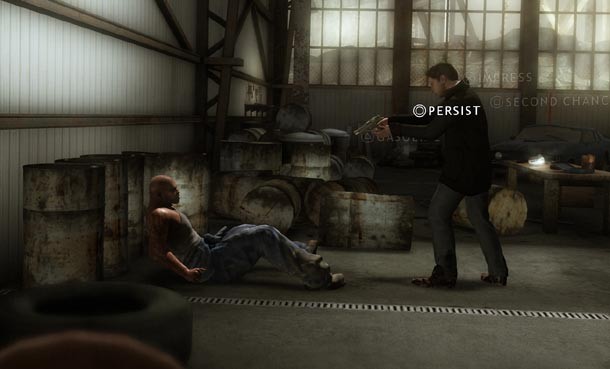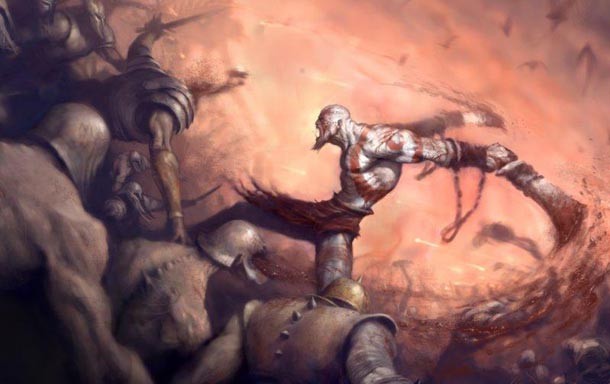On Heavy Rain and Believability in Games

I came into work this week, and all everyone seems to be talking about is Heavy Rain. I think this means it’s safe to start talking about the game’s story (even so I’ll try to keep this spoiler-free).
Heavy Rain is a great game, as you can see for yourself in our review. In fact, the game’s overall reception has been fairly positive. However, in order to put some perspective on the title, I thought I’d talk a little bit about an area of the game I found lacking.
Let me also say this (again). Overall I liked Heavy Rain’s story.
Now to the point. My main problem with the game’s narrative has to do with believability. I’ve often felt that believability is one of the most important aspects of creating an engaging tale. This doesn’t mean a story has to be realistic. Certainly there are many aspects of Lord of the Rings that are very unbelievable, but once you get dropped into Tolkein’s fictionalized world there is so much color to his universe that it’s hard not to get lost in the moment and – at least for a time – feel like you are somewhere else.
Lord of the Rings is a good story.
This power to transport is what makes any story compelling. It’s what makes horror movies scary. It’s what make’s comedies funny. It’s why we cried during Rudy and Forrest Gump (just admit it).
But a story has no power over your emotions if you don’t buy into the action that is taking place.
The key to pulling off this trick is making sure your characters – not your situations – are authentic. It doesn’t matter how ridiculous the world is as long as we can connect with the characters and understand why they’re doing what they’re doing.
Let’s look at a game that does have a story I consider to be engaging: God of War.

God of War’s world is about as unbelievable as you can get. It’s filled with mythical flying beasts, giant creatures whose forms blend with the environment, and the main character, Kratos, performs one ridiculous feat after another. But none of that matters because we’ve bought into the game’s tale of revenge.
In God of War we know that Kratos seeks revenge against Ares, the god of war, for years of personal enslavement and the god’s involvement in the death of Kratos’ family. We all understand Kratos’ motives, because revenge resonates inside us all. We all know what it’s like to hate someone. We all know what it’s like to want to seek revenge against someone (even if it is on a much pettier scale). We all have people we love, and we all know how we’d feel if they we’re murdered. That kind of hatred is in our DNA.
So when Kratos hunts down Ares and kills him we understand why.
In God of War, Kratos eventually has his revenge, but what if things had played out differently? What if at the end of the game, as Kratos was approaching Ares, Ares said, “Kratos don’t you get it? Remember how often you spoke of how your family drove you crazy. Remember how you said, ‘Sometimes I just want to strangle them?’ Well, I just fulfilled that wish. Don’t you get it? It was all a big joke.”
And then what if Kratos started laughing. “Hahaha, oh boy, I see what you did there, Ares. You really got me good that time. Let’s go share some ale.”
We’d go, “huh?” We’d think that was a ridiculous way to end the game. We’d think that the writers of God of War had all hopped on the crazy train. That kind of story betrays everything we know about human nature. Our heroes are supposed to fight injustice, not let it slide. Characters have the freedom to react to situations in many ways, but if they betray common sense it upsets us. Kratos could have forgiven Ares, and that could have been a good story, but that’s a much more challenging story to write.
There are basic rules by which all characters operate in fiction. This is ultimately the problem I had with Heavy Rain’s story. In many situations I found the characters acting in ways that seemed to betray their sensibilities, morals, or intelligence. This isn’t always bad, but I saw it happen enough that these situations began to pull me out of the moment, and the game lost some of its gravitas. In short, I think Heavy Rain lacked a certain amount of verisimilitude. For a game so focused on putting you in the role of another person this was a problem for me.
It’s hard to reference specific moments without giving away spoilers. So I won’t, but I will leave this open to discussion.
Anyone out there have a similar experience?
Anyone out there feel like disagreeing with me?

Get the Game Informer Print Edition!
Explore your favorite games in premium print format, delivered to your door.
- 10 issues per year
- Only $4.80 per issue
- Full digital magazine archive access
- Since 1991









